The Nearest Read online
Page 3
Kate shook her head. “One touch, and my skin crawled. So where are we going?”
“Herston.”
“Where in Herston? I’ll put it in the GPS.”
“I don’t know the name of the street, but I can give you directions once we’re closer.”
Kate wasn’t happy, but at this hour the drive wouldn’t take long. If he was messing with her, she’d know soon enough, and he’d regret it.
“How many of you are there?” she asked.
“Just me and my friend. And he won’t hurt anyone, I promise. I’d never have got involved if it was going to be like that.”
“So why did you do it at all?”
“It was his idea,” the man insisted. “I just went along with it.”
Kate frowned skeptically, but this wasn’t the time to start browbeating the only person who could reunite her with her family. Whether he was a simpleton who’d been led astray or a criminal genius who’d thought it was a good idea to climb into bed with her would be up to the investigating officers to decide, then the prosecutors, then a jury. Once Reza and Michael were safe, she would need to step back and leave everything to other people.
“How did you get Reza out of the house so quietly?”
“My friend drugged him.”
“With what, exactly?”
“Some liquid he put on a cloth. I don’t know what it was.”
Kate suspected he was lying; it sounded like something he’d seen in a movie, and if they’d tried it with chloroform Reza would have been struggling for so long it would have woken her ten times over.
“And how did you clowns even get into the house?”
“The spare key under the flowerpot.”
She fell silent. That was her fault; she should never have put it anywhere so obvious.
They were close to the city now; she could see the lights in the Aurora Tower ahead.
“Turn right here,” he told her.
“Past the hospital?”
“Yes.”
Kate turned into Butterfield Street, slowing down as they approached a small park that separated the road from the drop-off loop for the hospital’s entrance. In the early hours of the morning, there could well be visitors to the emergency department with all manner of substances in their bodies stumbling out from behind the greenery and onto the road without warning.
“And go left here.”
Kate brought the car to a halt. He was directing her into the hospital’s parking complex.
“What are you trying to tell me?” she demanded angrily. “Have they been hurt?”
“No. I promise you, both of them are fine.”
“Then why would they be here?”
The man said, “We need to go in. Please.”
“Why?”
Before Kate could stop him, he was out of the car, running back along the road and through the trees. She went after him, bewildered. The park was about the size of her back yard; he had no hope of losing her.
She caught up with him just outside the entrance to the emergency department. She’d feared she was going to have to tackle him to the ground on the concrete, but he stopped and turned, letting her collide with him, catching her in his arms so that their bodies came together in a sick parody of an embrace. She pulled away, furious. He smelled exactly like Reza, but that just turned her stomach.
He said, “Kate, I’m begging you, let them check you out.”
“What?”
“Let the doctors examine you. I can stay here with you, but you need to let me call someone to look after Michael.”
“If you think I won’t hurt you just because there are people around—”
The man held his hands up, shoulder high. “Look at me! If you don’t believe I’m Reza, tell me one thing that isn’t the same!”
Kate was tired. “You’re the right build, the right bone structure. Black hair and brown eyes aren’t exactly rare—assuming they’re natural—but everything else could be done with makeup.” Hadn’t Reza himself claimed as much, joking that he could pass for his own grandfather? Had they listened in to that conversation, too?
“Is that a professional opinion, DS Shahripour?” he taunted her. “Would you talk shit like that in court? Ask me something only Reza could know.”
“I’m not playing this game.”
He said, “I’m not a doctor, I don’t know what’s wrong with you. But what if it’s a stroke? If you’ve got a clot in your brain…” He put his forearm over his eyes, wiping away tears. “Please, Kate, let them help you.”
Kate stared at him in the harsh light of the entrance. Every small, dark hair on his cheeks was precisely where she’d expect it to be. The idea that anyone outside of Hollywood would even try to reconstruct that level of detail was ridiculous.
“Let’s go in,” she said. They were in the right place, after all.
They stepped through the self-opening doors together. As Reza was looking around to see where they should go to join the queue, Kate spotted a pair of security guards. When Reza walked forward, she veered away from him, approached the guards, and discreetly showed them her badge.
“That man is my husband,” she said quietly. “I need your help restraining him so he can be examined, otherwise he could be a danger to himself.”
Kate stayed a few steps behind as the three of them approached Reza together. He spread his arms in a gesture of disbelief. “What is this? Kate?” He turned to the guards. “My wife is ill. I don’t know what she told you—”
“You need to calm down, sir,” one of the guards said firmly. “The doctors are busy, but if you wait quietly someone will be able to see you soon.”
“No, she needs to see them! She’s the one who’s sick! Our son is in danger.”
“Sir, if you start making threats—”
“Kate? What did you say to them?” Reza—or whatever it was that now animated the shell of his body—glared at her in self-righteous horror.
Kate told the guards, “I’ll be back as soon as I can. Until then, you need to make sure that he gets a full psych evaluation.” They did not look happy, but they deferred to her authority.
She turned and walked away, glancing back a couple of times as the remnant of her husband began shouting and struggling. The guards had handcuffs, batons and Tasers; he wasn’t going anywhere.
On her way back to the car she started sobbing. When she pictured Reza—the man she knew, as he’d been just a few hours before—the thought of abandoning him in this wretched state horrified her. But she had to trust the doctors to take care of him; she couldn’t stay here waiting for a diagnosis. What mattered now was finding Michael.
As she drove north, she thought of calling the station and sending someone to the house ahead of her. But how could she explain walking out on her infant son, without sounding like she’d lost her mind? Michael had to be lying on a blanket somewhere, sleeping through all of this insanity. Maybe Reza had risen in the night and quietly hidden him, acting with good intentions in some strange twilight state before he was gone completely—saving his son from the thing he was about to become.
Kate couldn’t stop weeping. She took her hands off the wheel and let the car steer for her as the rain began to fall. Was it some kind of Alzheimer’s, like his father? But that made no sense; even if the early-onset form could strike at such a young age, she’d never heard of it happening overnight.
When she turned into her street, she saw a squad car outside her house, and lights on inside. She stopped and switched off her headlights, but kept the wipers running. Had a neighbor heard her shouting threats before she left?
The front door opened and someone walked out onto the porch: a tall, blond woman in civilian clothes carrying a wailing baby, followed by a uniformed female constable. Kate peered at them through the rain, making the best of the moments of clarity after the blades had swept the windshield clear, before fresh droplets appeared and distorted everything. The woman resembled her sister Beth, though it wasn�
��t her. The baby was swaddled in a blanket, making it hard to see properly, but it sounded like some awful imitation of Michael.
Had the thing in the cot not been a doll, after all? Where would such a doll have come from? Had Michael and Beth both gone the way of Reza?
Kate covered her face with her hands. What could turn a human being into a walking automaton, a vacant caricature of the person they’d been? Some kind of toxin? Some kind of disease?
When she looked again, the two women were in the squad car. The engine started, and the car drove away. But the lights were still on in the house. Someone was in there, waiting for her to arrive.
The thing that had been Reza must have wheedled its way into making a phone call, and whoever it had called had either been fooled into taking it seriously … or had needed no persuasion, because it already thought the same way.
Reza had been infected. Michael had been infected. Beth had been infected. How many more might there be? If she walked into that house and shared the same fate, she’d be powerless to help any of them.
Kate started the car and reversed back down the street. After ten meters, the supervisor began chanting threats and admonitions. She said, “Shut down, you’re malfunctioning.” She kept going until she reached the corner, then she turned and drove away.
5
The teller machine took her card without complaint, scanned her face, then offered her the usual menu. Reza had never been in any position to cancel her card himself, but whatever his remnant had told the police, the best thing was to get her hands on as much money as possible while she still could. Kate moved some funds between accounts and then succeeded in withdrawing her entire daily cash limit of five thousand dollars.
She sat in the car, trying to clear her head and see the way forward. It was beginning to look as if Reza and Beth, and maybe anyone else in the same condition, could pass as normal to an interlocutor who didn’t actually know them. Once he’d stopped humoring her with nonsense about the “kidnapping”, Reza had spoken coherently enough, making claims that might have sounded perfectly believable to a naive bystander. For all Kate knew, charming the hospital’s security guards into giving him a phone call had only been the start of it; he might even have been able to talk his way through an entire interview with an overworked psychiatric registrar, accustomed to more florid symptoms.
Reza’s uncle was on the other side of the country, and Beth had been divorced for years. But some of their friends would surely be able to spot the changes, backing up Kate’s assessment and ensuring the three victims got the treatment they needed.
Her phone rang. She stared at it for a while, then answered warily, “Chris? How are you?”
“I’m fine, Kate. But I’ve heard that people are worried about you.”
Fuck. Of all the colleagues she might have trusted to help her, Chris Santos had been top of the list, but he’d only had to speak two sentences to make it plain that he was infected too. And he was going to parrot Reza’s line that she was the problem? Kate resisted the urge to tell him she was having flashbacks to the time a gaggle of dim-witted scammers had called her one by one to say, “This is technical department of Windows operating system; we have detected a dangerous virus on your computer.” However many of them she told, in no uncertain terms, that they weren’t fooling her, there was always another one the next day trotting out exactly the same line.
“I had a fight with Reza,” she said. “Not even a fight, more a misunderstanding. It’s all good now.”
There was an awkward pause. “It’s just, your sister had to take the baby. No one wants to talk about child neglect charges, and I don’t think it has to go that far. But you need to come in and be interviewed, just to reassure everyone. I think your husband’s still freaked out.”
Kate struggled to frame her reply, wondering what the point was in humoring him at all—but it was possible that the call was being shared with people who weren’t just going through the motions, and actually believed she’d been at fault.
“I understand,” she said. “I’ll be in around nine o’clock.”
“Can I ask where you are now?”
“I’m not at home,” she admitted. “I knew Beth was looking after Michael, and I didn’t want to be there when Reza came home. It was just … a bit tense between us. I thought this would give us a chance to cool off.”
“Okay. But you’ll be at Roma Street by nine?”
“Absolutely.”
Kate stepped out of the car, stacked her phone on top of Reza’s behind the rear wheel, then ran over them repeatedly. How had Chris’s wife not noticed what had happened to him? But Kate hadn’t really socialized with the two of them for years; maybe they were estranged, and she just hadn’t heard it through the grapevine.
She got out of the car again and inspected the shattered electronics. She was having second thoughts about walking away; maybe it would be simpler to go undercover and play happy families with Reza, pretending that nothing was wrong while she investigated the outbreak.
But even if she could be that good an actor, Reza might infect her, dragging her down into the same emptiness. She had to believe that he and Michael and Beth still survived somehow, however deeply they’d been buried—but when she pictured the grotesque effigies they’d become, all she felt was revulsion.
The sky was light now, and she could hear traffic sounds rising up amid the birdsong. She hated the thought of abandoning the car, but eventually people would be looking for it, and she had no idea how far the disease had spread through the police force.
As she headed down the street, Kate thought of Natalie Grimes, waking in shock to find herself beside the thing that had once been her husband. Walking from room to room, discovering that even her beautiful daughters were gone. Convinced that her family had been erased, their minds irretrievably destroyed, and that the only loving thing to do had been to put the twitching puppets out of their misery.
Kate could understand the power of the woman’s grief. But she was not going to give up hope, herself, until she had proof beyond doubt that there was no cure, and that everyone she cared about really was gone forever.
6
Kate found a small motel where the clerk was happy to take cash up front, and for a modest surcharge allowed her to check in without showing ID. In her room, she sat on the bed staring down at the torn carpet, trying to decide who she could trust to be her allies, now that Chris had been ruled out. She drew up a list of twelve names, but when she thought about each one seriously, her confidence began to wane. It was not that any of them had failed to be loyal and supportive in the past, but when she pictured the actual conversation she would need to have with them to enlist their help, the idea that they would back her seemed preposterous. Each time she played out the scenario in her head, every trace of the old friendships she was relying on simply faded away, and the encounter ended with a cold stare.
More than friends, she needed evidence. And since no epidemiologist was going to drop everything and come to her aid, she needed to start with testimony, from as many people as possible, showing that the symptoms she’d observed in her own family had been seen elsewhere.
Without knowing the mode of transmission it was hard to say how the disease might have spread, but the neighborhood around Natalie’s house was the obvious place to begin. Kate left the motel and set off on foot, taking care to avoid intersections where she knew there would be cameras.
When she arrived, the house itself was still cordoned off. She started with the neighbors on the right, but no one was home; it was only four doors down that she finally got an answer. Her knocking summoned an elderly man who was clearly not pleased to have been woken from sleep—but then, chastened by the gravity of the subject, he invited her in.
“I know you’ve spoken to my colleagues already,” Kate explained apologetically, “but if there’s anything else you remember from that time, it could be important.”
“Like what?” the man asked. “I never
heard Natalie and Rob fighting. The kids could be noisy; you know how girls that age screech sometimes? But that was just playful. It never sounded like someone was hurting them.”
Kate said, “Apart from the family, has there been anything unusual you’ve noticed going on in the area?”
He pondered the question, but shook his head.
“Anyone acting out of the ordinary? Maybe a stranger, maybe not. Maybe even someone you thought you knew well.”
He ran his fingertips across his forehead, disconcerted by the apparent suggestion that some neighbor he’d joked with over the fence might have stabbed this family to death.
“Anyone acting out of character?” Kate pressed him.
“No,” he said firmly. But with the stakes seemingly so high, perhaps he felt compelled to err on the side of caution. Using the murders as a pretext for her questions was going to make it harder to get an honest response.
She worked her way down the street then back, sketching a map of the area as she broadened her search. Having missed her appointment at Roma Street and trashed her phone, she suspected that her badge number would have been revoked by now, so whenever people answered the door with their phone in their hand, she made an excuse and withdrew, lest they TrueCop-ped her and made things awkward.
By early evening, she’d conducted thirty-seven interviews. She was thinking of taking a break and grabbing some food when a door opened and before she’d even raised her badge, the middle-aged woman standing in front of her asked anxiously, “Have you found him?”
“I’m afraid not,” Kate extemporised. Whoever the woman was talking about, that was almost certainly true. “But I’d like to ask you for a few more details, if I could.”
“Of course.”
Kate identified herself and followed the woman into the house. In the living room, there were family photos: mother, father and teenage son.
“Is anyone else at home right now?” Kate asked.
“No, my husband’s in the city. He’s still looking for Rowan. Game arcades, McDonald’s … he’s got no money, but we don’t know where else he’d go to pass the time.”

 Zendegi
Zendegi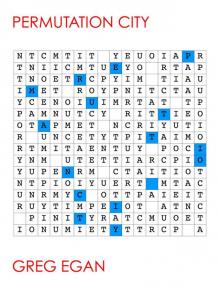 Permutation City
Permutation City The Eternal Flame
The Eternal Flame Artifacts
Artifacts Wang's Carpets
Wang's Carpets Dichronauts
Dichronauts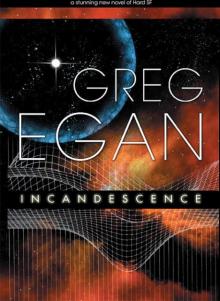 Incandescence
Incandescence Teranesia
Teranesia Schild's Ladder
Schild's Ladder Quarantine
Quarantine The Four Thousand, the Eight Hundred
The Four Thousand, the Eight Hundred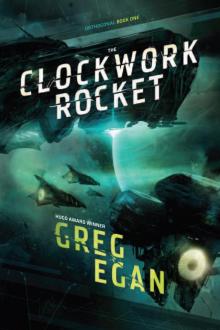 The Clockwork Rocket
The Clockwork Rocket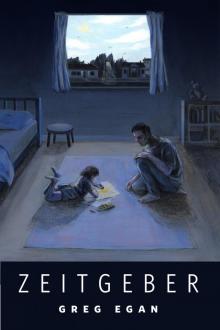 Zeitgeber
Zeitgeber Phoresis
Phoresis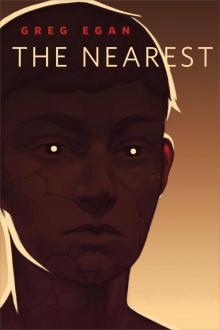 The Nearest
The Nearest Diaspora
Diaspora Instantiation
Instantiation Distress
Distress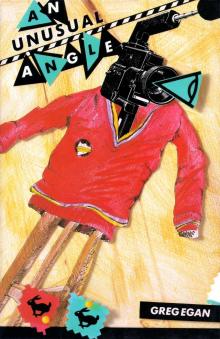 An Unusual Angle
An Unusual Angle Oceanic
Oceanic The Arrows of Time
The Arrows of Time Axiomatic
Axiomatic![Anthology 2. Luminous [1998, 2010] Read online](http://i1.bookreadfree.com/i/03/18/anthology_2_luminous_1998_2010_preview.jpg) Anthology 2. Luminous [1998, 2010]
Anthology 2. Luminous [1998, 2010] Perihelion Summer
Perihelion Summer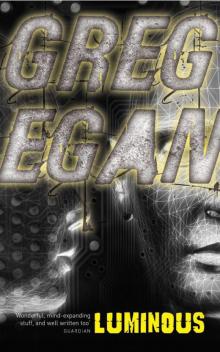 Luminous
Luminous